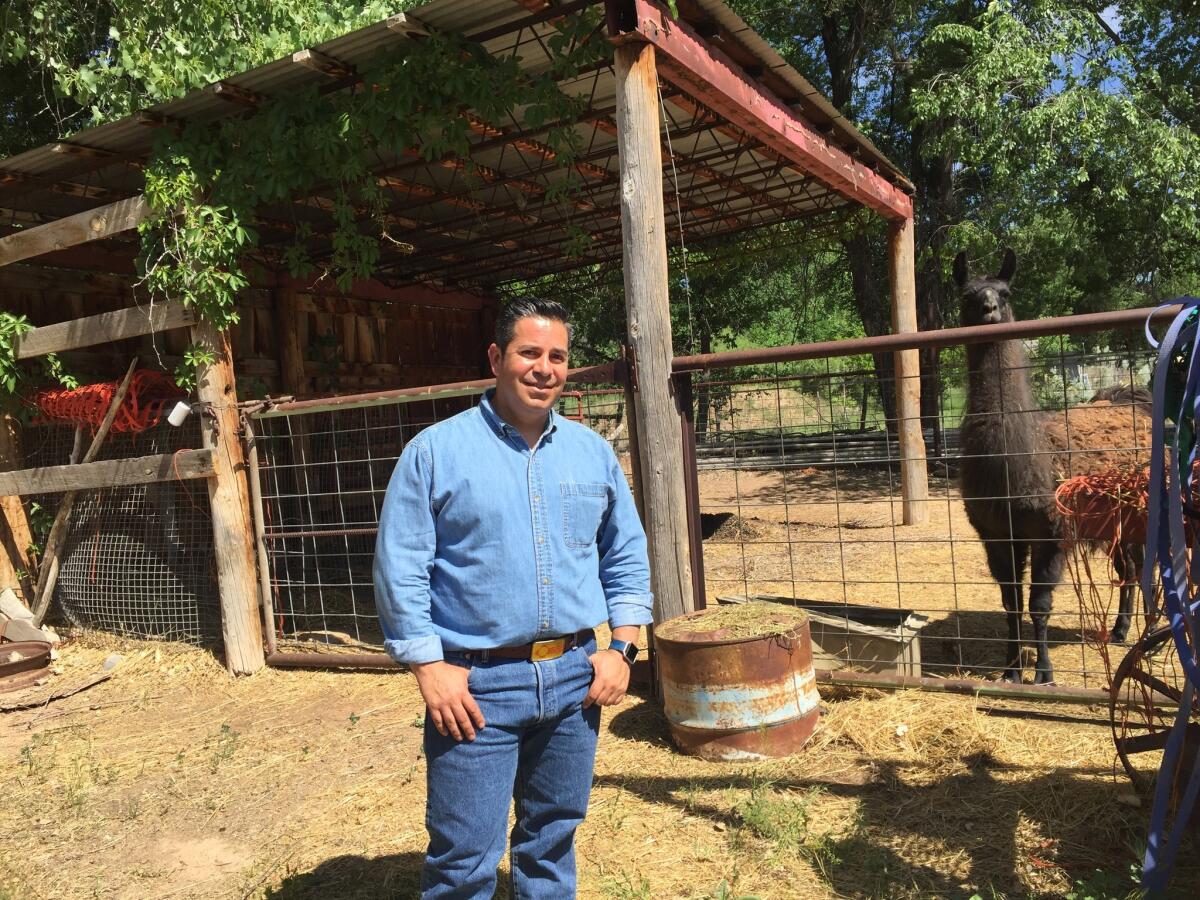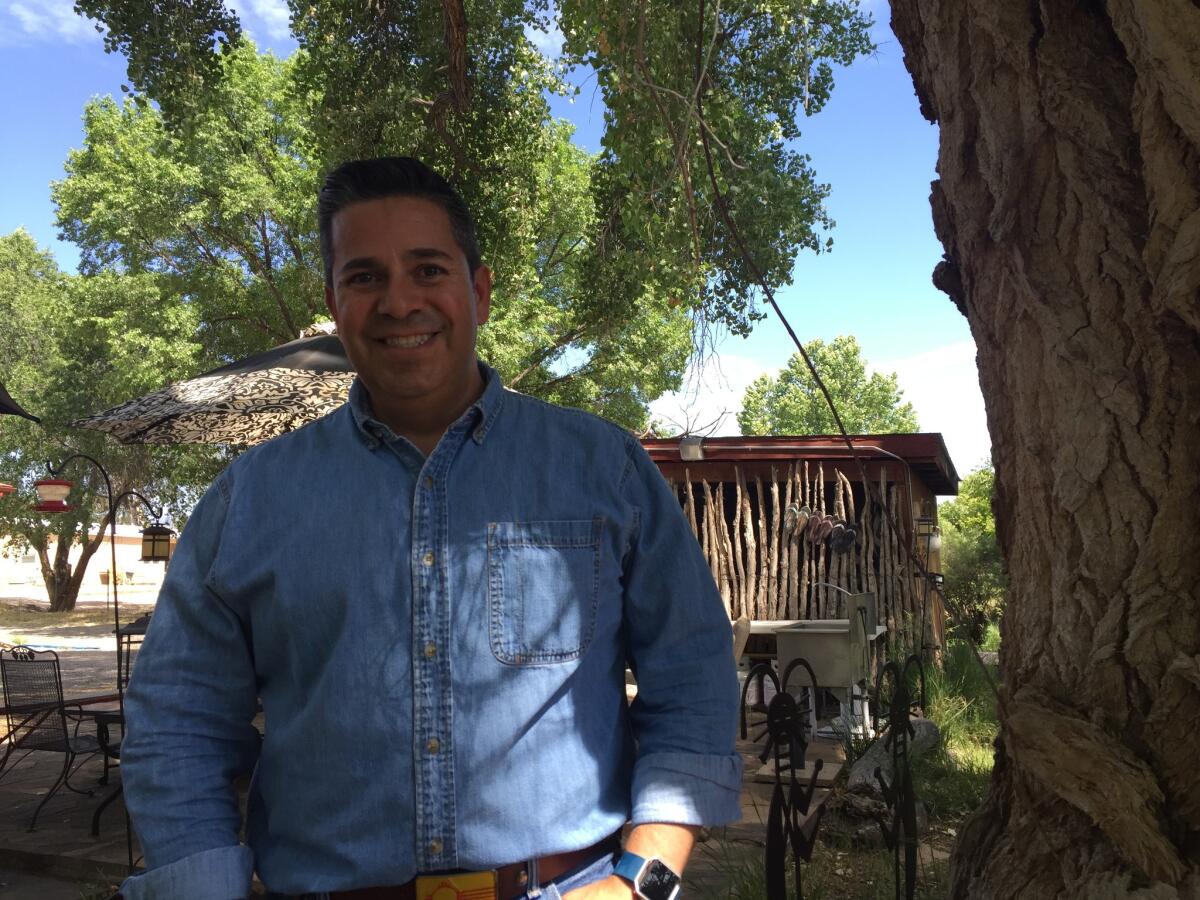Is this small-town congressman from New Mexico tough enough to win Democrats the House majority?

- Share via
Reporting from Nambé, N.M. — Ben Ray Luján was a relatively new congressman, barely finding his way through the halls of the Capitol, when his mom called with an urgent message from home.
The llamas, she told him, had broken out of their pen again.
From nearly 2,000 miles away, Luján helped her figure out how to corral the animals, which were supposed to be guarding the family’s sheep herd in New Mexico.
It’s a skill that could serve him well in his current job, in which he will be expected to play a leading role in guiding Democrats as they try to win the House majority in 2018.
“Something that I learned just around here, growing up on this small farm, is that every job mattered, and whatever job you were asked to do or tasked with, you had to do it, and you had to do it right,” said Rep. Luján, 45, sitting beneath a towering cottonwood at his family’s generations-old farm.
As chairman of the Democratic Congressional Campaign Committee, Luján has a difficult, often thankless, job at a time when almost every Democrat seems to have an opinion about what the party needs to win in the age of President Trump.
Energetic anti-Trump groups are hammering the campaign committee for not doing enough to recruit and promote fresh candidates, portraying party leaders as tone-deaf to Trump’s populist appeal.
At the same time, more moderate forces are pushing Democrats to the center, trying to keep the party from drifting too far left into the Bernie Sanders wing.
It falls largely to Luján to shepherd the campaign arm of the fracturing party, united mainly by opposition to Trump and by a desire to win back the House majority. Luján must help recruit dozens of candidates and persuade deep-pocketed donors to shell out more than $200 million for the midterm election.

“This is a moment of opportunity and a moment of truth for Ben Ray Luján,” said Adam Green, co-founder of the Progressive Change Campaign Committee, an outside group promoting progressive candidates.
“Does he fill the map with bold, inspiring economic populists who can win in red and purple districts? Or does he go the traditional route of finding milquetoast candidates or self-funding candidates who lose cycle after cycle? That’s what a lot of people are looking at.”
After losses in four special elections this spring, many Democrats blamed party leaders for failing to pick up a single House seat.
But Luján held firm, rejecting pressure to spend more money in long-shot races. Although the campaign committee poured $6 million into suburban Atlanta, where Democrat Jon Ossoff appeared to have the best chance to pick up a traditionally Republican seat, it declined to go big in deep-red districts in Kansas, Montana or South Carolina. Ossoff still lost, but the campaign committee learned valuable lessons and Luján saved resources for what he believes are more promising battles to come.
It was an unexpectedly hard-line approach from the typically good-natured Luján, who is preparing to go on the offense next year in 80 Republican-held battleground districts, particularly those Trump lost to Hillary Clinton or only narrowly won. Colleagues made note of his resolve.
“The chairman’s responsibility is to look at it in a coldblooded, strategic way — to look at what we need for 2018 to win the majority,” said Rep. David Cicilline (D-R.I.), co-chairman of the House Democrats’ Policy and Communications Committee. “That always creates some disappointment for people.”
Laid-back and bluejean casual, Luján seemed like an odd choice when he was first tapped for the job. He was pulled from relative obscurity as a back-bench, four-term congressman from a small, poor state, hardly seen as a power player in Washington.
But as the first Latino to run the committee — and the first Westerner in years — Luján represents an aspirational face of the party, one that is more energetic, youthful and rural.
On his family’s 4-acre farm nestled among tribal lands in the Nambe valley — the street is named for his grandparents — Luján explains his system for cooking bite-size chicharrones snacks on a New Mexican disco — a wok-like pan originally made from a tractor disc — on the outdoor grill.
Later he shows off rows of lettuce, tomatoes and cucumbers growing in a greenhouse he built on weekend trips home.
His father, the long-serving speaker of the state House, encouraged him to pursue politics, which he did only after a circuitous route through college, finally graduating later in his 20s after working night shifts as a blackjack dealer at a nearby tribal casino.
“You learn how to visit with people, carry on a conversation,” he said about his time playing cards. “My political opponents tried attacking me for having those jobs. This paid the bills. If you’re going to attack me doing that, then you clearly don’t understand the constituents you’re fighting to represent.”
His predecessors at the Democratic Congressional Campaign Committee were usually hard-charging Washingtonians — think Chicago Mayor Rahm Emanuel or former New York Rep. Steve Israel.
But House Minority Leader Nancy Pelosi saw in Luján a well-liked and charismatic newcomer when she asked him to take the job after the 2014 midterm election losses.
Luján accepted and quickly set out to expand the committee’s team. He stacked it with lawmakers newer to Congress, naming vice chairpersons from regions across the country. He also worked to improve relations with minority groups in the House, particularly the Congressional Black Caucus, which often feels shortchanged in campaigns.
His first big challenge, the 2016 election, became a brighter spot on a dismal night for Democrats, with six House seats netted. But disappointed Democrats agitated for House leadership changes after Trump’s win.
When Luján sought election as chairman later that year — the job would no longer be appointed by Pelosi, as she heeded demands to loosen her grip — he fended off a potential challenger and won unopposed.
This year he was hit with an ethics review after a conservative watchdog gorup filed a complaint over his use of photos from a Democratic sit-in on the House floor for his own reelection fundraising, a potential violation of House rules.
Overservers say Luján has grown into the job, an assessment he readily admits.
A core debate among House Democrats is whether their focus should be on reaching white, working-class Trump Democrats who have broken away from the party, or on investing more heavily in outreach to the African America, Latino and other electoral groups sometimes taken for granted.
Democrats need 24 seats to pick up the majority, about as many as a party historically wins during midterm elections when it does not control the White House.
The committee is trying new strategies to tap into unprecedented grass-roots enthusiasm, including recruiting more locals for campaign jobs rather than parachuting in experts from Washington, believing the new faces will provide on-the-ground expertise and build a deep bench of new leaders.
It has also moved its entire Western state operation to Southern California to aggressively target Republican-held House seats in Orange County.
“We need to do a better job in understanding that we’re talking about real people,’’ Luján said. “And be able to connect with those people all across the country, like the ones I represent and the family I grew up in.”
Luján makes no secret that the committee is willing to take sides in primary battles, a position that angers many Democrats.
Pelosi, as party leader in the House, still plays a mighty role, particularly as fundraiser in chief, and Luján must toggle between his allegiance to the San Francisco Democrat and the reality that some in the party would prefer new leadership.
“No matter what you do, somebody’s going to be upset, especially if you have high expectations — and we do have high expectations,” said Rep. Gregory W. Meeks (D-N.Y.), chairman of the Congressional Black Caucus’ political action committee.
Meeks says he appreciates Luján’s more open, bottom-up approach at the campaign committee, “as opposed to someone just saying, ‘This is what we’re doing.’”
“We have honest, open, tough conversations,” he said. “He can deal with it.”
As the hot afternoon sun begins to relent on his farm, Luján walks across the property to the pen with his last llama, Tony. The sheep have died or been sold off and the other llama sent to a new home, but he has plans to resume the family traditions once he can repair the fences to protect from predators. He calls the farm work “therapy.”
Luján recalls once when he couldn’t get close enough to collar the llamas after another escape. He simply parked his trailer up the road, filled the bed with feed, unfolded his lawn chair nearby, sat down and waited.
Eventually, the llamas climbed in and he took them home.
It’s another lesson from the farm — this one in patience — that could come in handy for Democrats in 2018.
ALSO
Trump wants a border wall, but few in Congress want to pay for it
More coverage of politics and the White House
More to Read
Get the L.A. Times Politics newsletter
Deeply reported insights into legislation, politics and policy from Sacramento, Washington and beyond. In your inbox three times per week.
You may occasionally receive promotional content from the Los Angeles Times.











